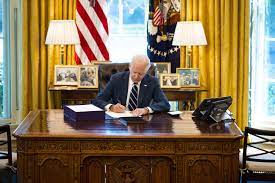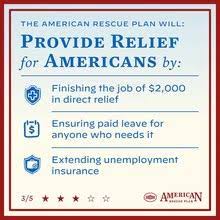Isabel Rozes ‘24
The American Rescue Plan Act of 2021, passed on March 10th, fails to benefit independent schools like Episcopal although it promises aid to EA parents and faculty. The Act designates around $165 billion dollars for Federal Education Funding and COVID-19 relief targeted specifically at schools, with $2.75 billion given specifically to schools that fall under the designation of the “Emergency Assistance to Nonpublic Schools” Fund (EANS).

In addition, the ARP provides economic support for individuals, state and local governments, and small businesses and tools to combat the virus. President Joe Biden signed it into law on March 11, 2021.
According to Samuel Arnold, Policy Director for Pennsylvania Senator Tim Kearney of the 26th district, the Episcopal Academy, as a nonpublic school, will not receive any funding automatically from the ARP. He notes, however, that “the ARP does give Pennsylvania $144 million to allocate to non-public schools across the state. A document by the Southern Regional Education Board (SREB) delineates how the EANS designation operates, explaining that “EANS program funding is based on the number of children ages 5 to 17 at 185% or less of the federal poverty level enrolled in non-public schools in the state in relation to the number of all such children in all states.” As such, EA is not eligible for monetary compensation as a part of EANS.
While this might seem unfair, many Episcopal Academy parents will be able to take advantage of the ARP’s tax credit programs, stimulus payments and financial relief programs, which should make it easier to pay for tuition costs and their other expenses.”
Arnold specified that 86% of PA adults and 84% of PA children have received the $1,400 stimulus payments, so “if you apply that same percentage to Delco’s approximate population of 565,000, that would be $680 million getting pumped into our county economy, helping to pay for people’s necessities and increasing spending at our local businesses.”
Dr. Adam Lavallee, Upper School economics teacher, explains this “multiplier effect” as the idea that “if the government gives me $100 and I spend it on takeout from a local restaurant, then they pay their workers’ wages, and those people buy things, and so on. So each $100 of stimulus multiplies to have a higher economic impact.” Lavallee notes that a stimulus package does more than provide immediate relief; the impact on communities occurs when people spend that money, most importantly when they spend it locally.

Dr. Douglas Borgerson, an Episcopal Academy Middle School teacher, is the Borough Council President of West Conshohocken. He explains that an estimated $142,000 has been allocated to West Conshohocken Borough in Montgomery County. Half of the money to the borough will be allocated in June and the rest will be distributed later on.
Borgerson adds that the West Conshohocken Council will have discussions with the Solicitor and others on where the money will be allocated and invested. Borgerson explained that there are guidelines for permissible uses of the funds, including supplementing the pay of essential workers, and making investments in water and sewer infrastructure, and impermissible uses, such as directly or indirectly offsetting taxes or deposits into pension funds.
The ARP has 70% support among adults, according to the Pew Research Center survey. Vince Vento ‘21, Leader of the Young Democrats Club states, “I think [the ARP] will have a positive impact on the US as a whole because, although we are starting to open up everything more, there are still people who are jobless and do not have a sufficient income. This would be a positive for them.”
Specifically, the ARP extends or provides economic impact payments, child tax credits, state and local recovery funds, capital project funds, restaurant revitalization funds, homeowner assistance funds, emergency rental assistance, state small business credit initiative, employee retention tax credit and paid leave credit programs, and unemployment compensation.
According to the March 31, 2021 notice “What the American Rescue Plan Means for Local Governments,” published by the Pennsylvania State Association of Boroughs, the state of Pennsylvania is slated to receive $7.293 billion for state government and $2.843 billion for counties. Delaware County will receive an estimated $110 million in direct funding relief.
In a March 14, 2021 Letter to the Delco Times Editor, Senator John Kane of Pennsylvania 9th District asserted that “this piece of legislation will improve the lives of millions of people. It puts money in pockets, vaccines in the hands of healthcare providers, and resources back into our communities.”